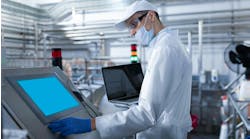Trends in sustainable manufacturing, with AVEVA’s chief sustainability officer
AVEVA's Lisa Johnston
The relationship between sustainability and smart-manufacturing approaches is gaining traction, both among solution providers who are prioritizing this pairing and end-users who are demanding it. (This was a hot topic throughout AVEVA World Digital 2021)
Here we chat with Lisa Johnston, AVEVA’s chief sustainability officer, on trends in the sustainability / manufacturing space. Take a look…
Smart Industry: Describe your role as chief sustainability officer.
Lisa: I’ve been responsible for driving the sustainability program within AVEVA since 2020, which involves developing the company’s strategy to deliver human, economic and environmental value. This means looking at every level of the organization to identify and create sustainable outcomes for our customers, and for the communities where we live and work.
Smart Industry: Describe AVEVA's sustainability strategy.
Lisa: We have the expertise, the network and the capabilities to realize the sustainable industries of the future. We recognize that technology has a core part to play—and we take our responsibility seriously. Our strong Environmental, Social, and Corporate Governance (ESG) practices were recognized again this year when AVEVA was included in the FTSE4GOOD Index Series for the fourth consecutive year. Good governance is foundational to making progress on all other sustainability-related objectives, and so we are especially proud to have scored full marks for corporate governance again this year and well above the average for our sector on anti-corruption and tax transparency.
As a software company we have a relatively low carbon footprint, but we are taking steps to set company-wide climate targets and will report to the Carbon Disclosure Project (CDP) next year. We are also evolving our environmental reporting to reflect how our software can help industries address the climate crisis and to align with the Task Force on Climate-related Financial Disclosures (TCFD) requirements in 2021.
We’re also committed to fostering a culture of collaboration, belonging, wellbeing, and learning across the company. Since 2018 we have pledged 1% of our profits to support local community charities and initiatives via our employee-led Action for Good Program. We invest 12% of our revenues in R&D and have partnerships with more than 200 universities worldwide sharing our software to support budding engineers.
Smart Industry: What are the human, economic, and environmental values within a sustainability strategy?
Lisa: Successful digital partnerships are founded on mutual understanding and commitment, whatever the market demands. We are committed to partnering with others that share our values and limitless-possibilities mindset to meet the objectives of the UN Sustainable Development Goal, to prevent the worst impacts of climate change, and to advance more equitable economic development.
Smart Industry: In terms of your partnership with Microsoft, how are you working together to bring more value to what businesses need?
Lisa: There are four themes common to our customers’ environmental-sustainability agendas—tackling climate change; the need to boost circularity; the energy transition to renewables; and the drive for enhanced transparency and traceability in operations and supply chains. We are well positioned to support all four. We can help increase energy efficiency, minimize noxious emissions and optimize the effective use of valuable natural resources, advancing sustainable development across diverse sectors. This growing focus on the roles we must play in the coming transition has reshaped our strategy, mission and purpose in the past year.
Smart Industry: How is the COVID pandemic changing our approaches to sustainable manufacturing?
Lisa: In the past year, humanity has faced a challenge that’s unique in history in its scale and scope. Many of our industries have been the fortunate ones. At AVEVA, we’re proud to be supporting the essential front-line teams who are supporting the response to COVID-19. But we can’t overemphasize how much has transformed. Put simply, never have eight billion people worked together to lock down economies and beat a global enemy.
Smart Industry: What most excites you about sustainability in the coming years?
Lisa: Most sustainability challenges, like addressing the climate crisis and realizing the Paris Agreement, are inherently complex. They demand collective action, new technology and scalable solutions to make progress. Digital technologies are already helping to cut carbon emissions by up to 15% in energy, manufacturing, agriculture, buildings, services, transportation and traffic management. This corresponds to more than the combined carbon footprints of the EU and the US. AVEVA offers solutions that can be applied across more than nine industry verticals to address such challenges. For example, by providing real-time energy data and supporting improved operational efficiency, we have the potential to help hundreds if not thousands of our customers—some of whom have very sizable carbon footprints—to cut their energy consumption and emissions.
Smart Industry: Has the role of women in technology changed in this era of digital transformation?
Lisa: It’s one of the reasons behind our recent announcement that AVEVA has joined Business for Social Responsibility (BSR) works. BSR has extensive experience in catalyzing business action on climate change and women’s empowerment.
Smart Industry: How do automation and larger IIoT tools/techniques/technologies change the modern workforce?
Lisa: Digital transformation is enabling organizations, particularly in the industrial sector, to enhance their capabilities and increase their returns across their assets and operations. The use of the Industrial Internet of Things (IIoT) through real-time analytics has had a profound impact, by improving response times to potential issues and minimizing possible damage to the environment, which has resulted in the avoidance of costly unscheduled shutdowns, while improving profits. Digital twin, big data and artificial intelligence can drive deeper insights, which show the path to improving sustainability performance.
You get agility and flexibility through a connected workforce too, and this brings benefits from agile collaboration and real-time innovation to the sharing of best practices and building connection between workers (whether they are in the same office or on different sides of the planet) to reduce carbon usage, drive efficiency and support environmental and social sustainability.




